LSST MG629: Developing Leadership and Management Skills Report
VerifiedAdded on 2022/11/29
|17
|4481
|103
Report
AI Summary
This report, submitted for the MG629 module at LSST, focuses on the development of leadership and management skills. It begins with a self-assessment of existing leadership and management capabilities, employing various academic and theoretical models such as democratic and autocratic leadership styles, Kotter's and Lewin's change management models, Porter's five forces, SWOT and PESTLE analyses, and team life cycle models. The report then outlines a range of individual and team-based leadership and management developmental activities. These activities include implementing leadership plans, providing employee training and development, assessing leadership styles, and leveraging strengths to achieve competitive advantages. The report includes appendices with questionnaires (Honey and Mumford), Belbin's test analysis, and various self-reflection activities. The report concludes with a summary of the findings and recommendations for continuous improvement in leadership and management practices.
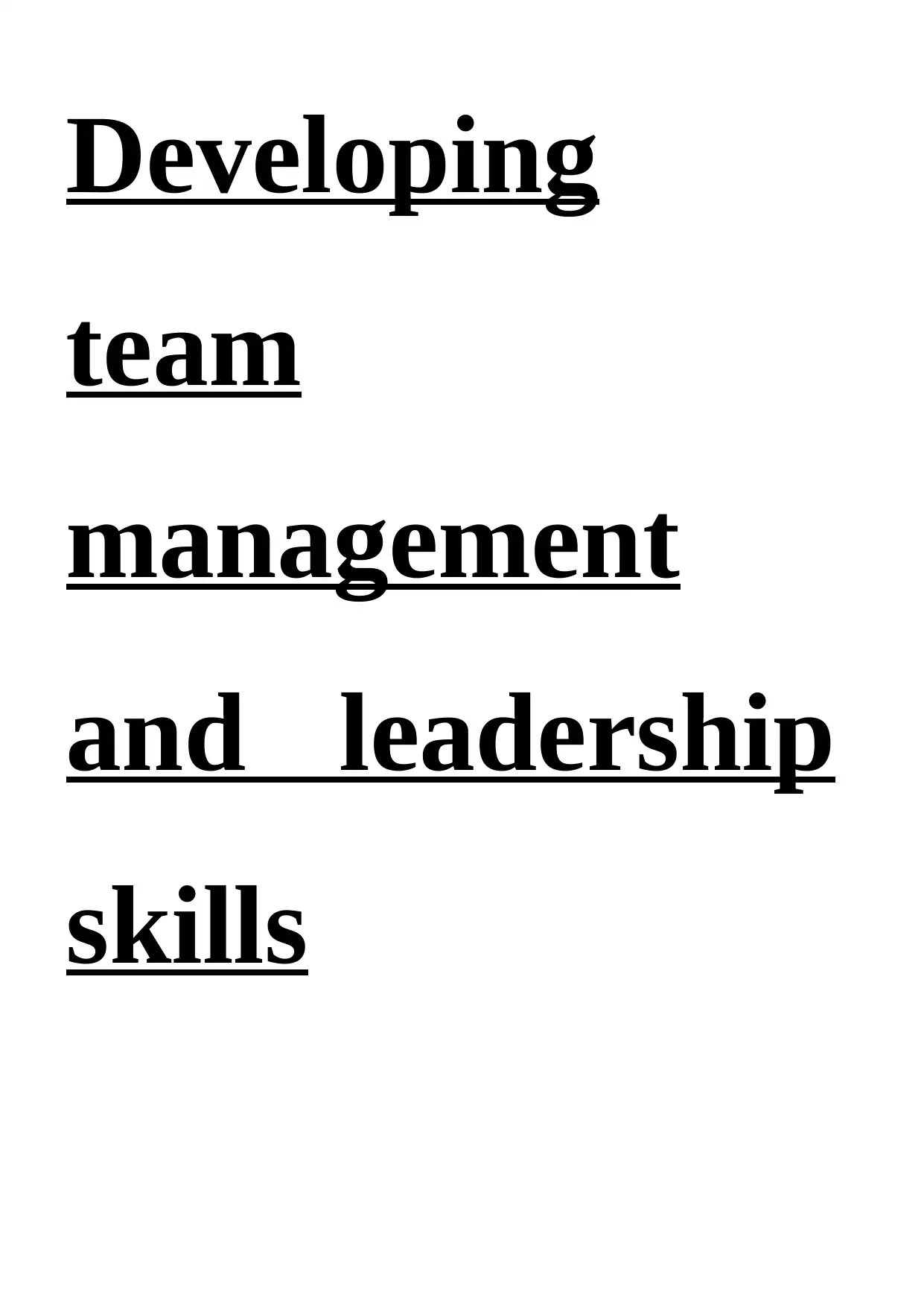
Developing
team
management
and leadership
skills
team
management
and leadership
skills
Paraphrase This Document
Need a fresh take? Get an instant paraphrase of this document with our AI Paraphraser
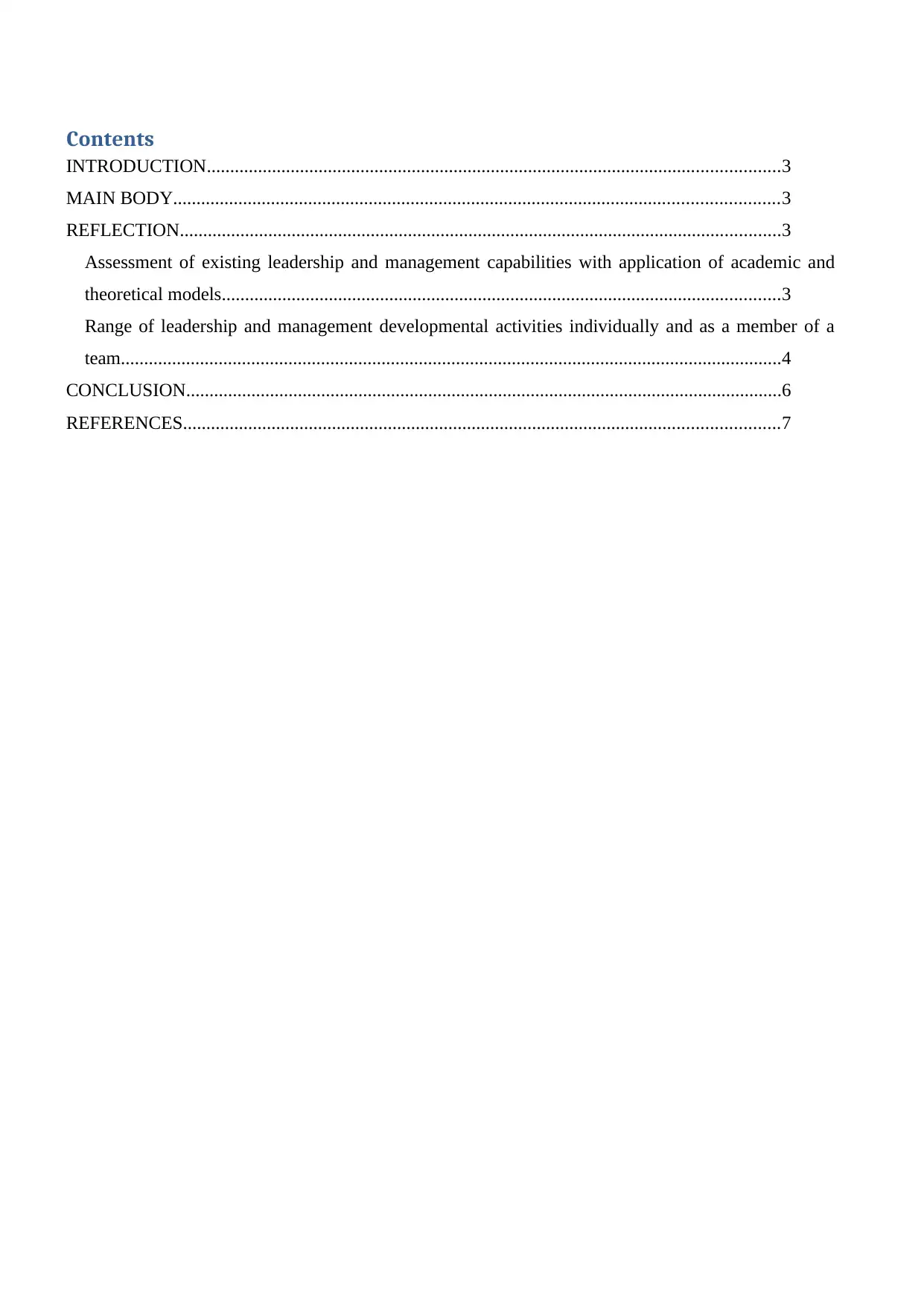
Contents
INTRODUCTION...........................................................................................................................3
MAIN BODY..................................................................................................................................3
REFLECTION.................................................................................................................................3
Assessment of existing leadership and management capabilities with application of academic and
theoretical models........................................................................................................................3
Range of leadership and management developmental activities individually and as a member of a
team..............................................................................................................................................4
CONCLUSION................................................................................................................................6
REFERENCES................................................................................................................................7
INTRODUCTION...........................................................................................................................3
MAIN BODY..................................................................................................................................3
REFLECTION.................................................................................................................................3
Assessment of existing leadership and management capabilities with application of academic and
theoretical models........................................................................................................................3
Range of leadership and management developmental activities individually and as a member of a
team..............................................................................................................................................4
CONCLUSION................................................................................................................................6
REFERENCES................................................................................................................................7
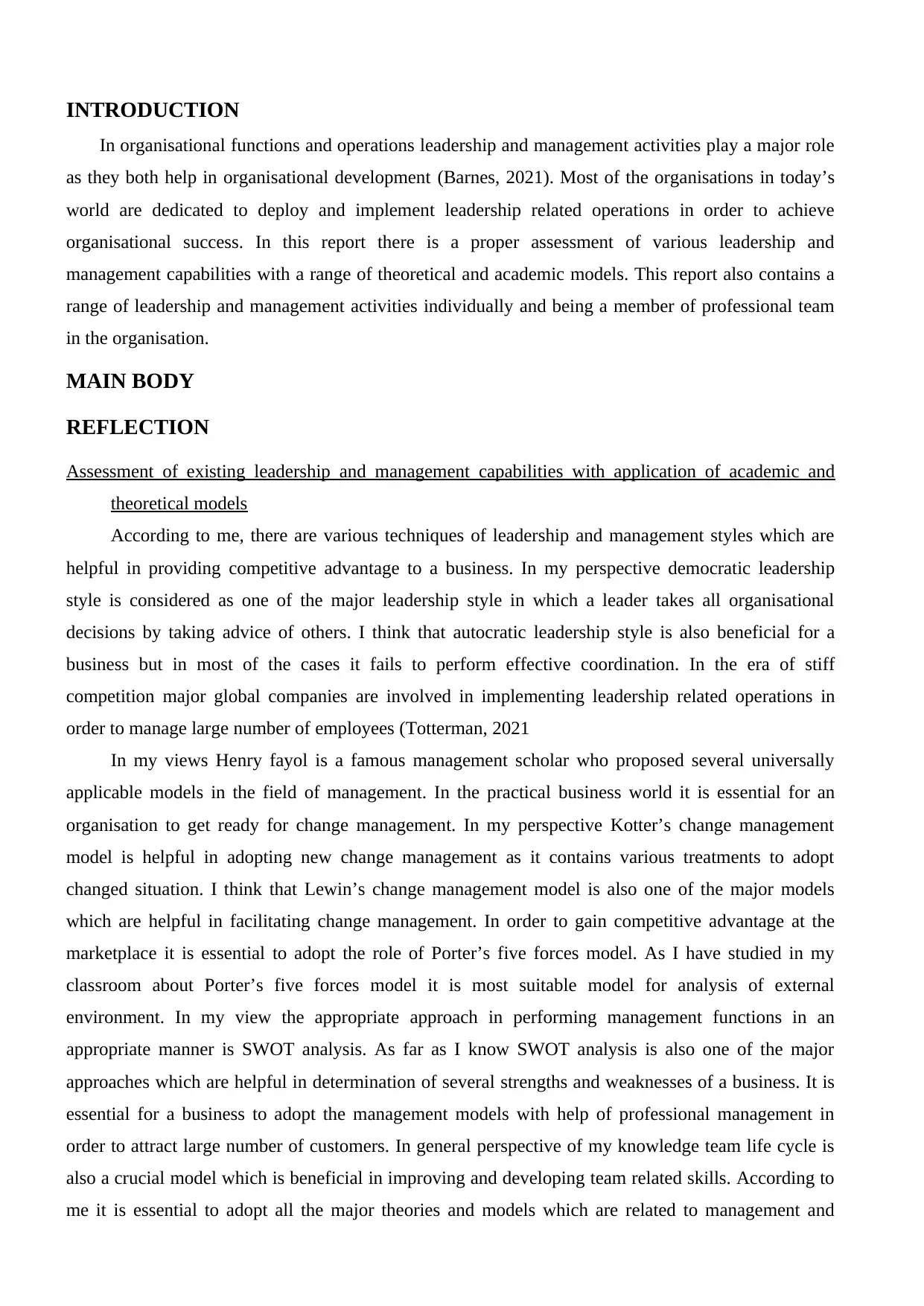
INTRODUCTION
In organisational functions and operations leadership and management activities play a major role
as they both help in organisational development (Barnes, 2021). Most of the organisations in today’s
world are dedicated to deploy and implement leadership related operations in order to achieve
organisational success. In this report there is a proper assessment of various leadership and
management capabilities with a range of theoretical and academic models. This report also contains a
range of leadership and management activities individually and being a member of professional team
in the organisation.
MAIN BODY
REFLECTION
Assessment of existing leadership and management capabilities with application of academic and
theoretical models
According to me, there are various techniques of leadership and management styles which are
helpful in providing competitive advantage to a business. In my perspective democratic leadership
style is considered as one of the major leadership style in which a leader takes all organisational
decisions by taking advice of others. I think that autocratic leadership style is also beneficial for a
business but in most of the cases it fails to perform effective coordination. In the era of stiff
competition major global companies are involved in implementing leadership related operations in
order to manage large number of employees (Totterman, 2021
In my views Henry fayol is a famous management scholar who proposed several universally
applicable models in the field of management. In the practical business world it is essential for an
organisation to get ready for change management. In my perspective Kotter’s change management
model is helpful in adopting new change management as it contains various treatments to adopt
changed situation. I think that Lewin’s change management model is also one of the major models
which are helpful in facilitating change management. In order to gain competitive advantage at the
marketplace it is essential to adopt the role of Porter’s five forces model. As I have studied in my
classroom about Porter’s five forces model it is most suitable model for analysis of external
environment. In my view the appropriate approach in performing management functions in an
appropriate manner is SWOT analysis. As far as I know SWOT analysis is also one of the major
approaches which are helpful in determination of several strengths and weaknesses of a business. It is
essential for a business to adopt the management models with help of professional management in
order to attract large number of customers. In general perspective of my knowledge team life cycle is
also a crucial model which is beneficial in improving and developing team related skills. According to
me it is essential to adopt all the major theories and models which are related to management and
In organisational functions and operations leadership and management activities play a major role
as they both help in organisational development (Barnes, 2021). Most of the organisations in today’s
world are dedicated to deploy and implement leadership related operations in order to achieve
organisational success. In this report there is a proper assessment of various leadership and
management capabilities with a range of theoretical and academic models. This report also contains a
range of leadership and management activities individually and being a member of professional team
in the organisation.
MAIN BODY
REFLECTION
Assessment of existing leadership and management capabilities with application of academic and
theoretical models
According to me, there are various techniques of leadership and management styles which are
helpful in providing competitive advantage to a business. In my perspective democratic leadership
style is considered as one of the major leadership style in which a leader takes all organisational
decisions by taking advice of others. I think that autocratic leadership style is also beneficial for a
business but in most of the cases it fails to perform effective coordination. In the era of stiff
competition major global companies are involved in implementing leadership related operations in
order to manage large number of employees (Totterman, 2021
In my views Henry fayol is a famous management scholar who proposed several universally
applicable models in the field of management. In the practical business world it is essential for an
organisation to get ready for change management. In my perspective Kotter’s change management
model is helpful in adopting new change management as it contains various treatments to adopt
changed situation. I think that Lewin’s change management model is also one of the major models
which are helpful in facilitating change management. In order to gain competitive advantage at the
marketplace it is essential to adopt the role of Porter’s five forces model. As I have studied in my
classroom about Porter’s five forces model it is most suitable model for analysis of external
environment. In my view the appropriate approach in performing management functions in an
appropriate manner is SWOT analysis. As far as I know SWOT analysis is also one of the major
approaches which are helpful in determination of several strengths and weaknesses of a business. It is
essential for a business to adopt the management models with help of professional management in
order to attract large number of customers. In general perspective of my knowledge team life cycle is
also a crucial model which is beneficial in improving and developing team related skills. According to
me it is essential to adopt all the major theories and models which are related to management and
⊘ This is a preview!⊘
Do you want full access?
Subscribe today to unlock all pages.

Trusted by 1+ million students worldwide
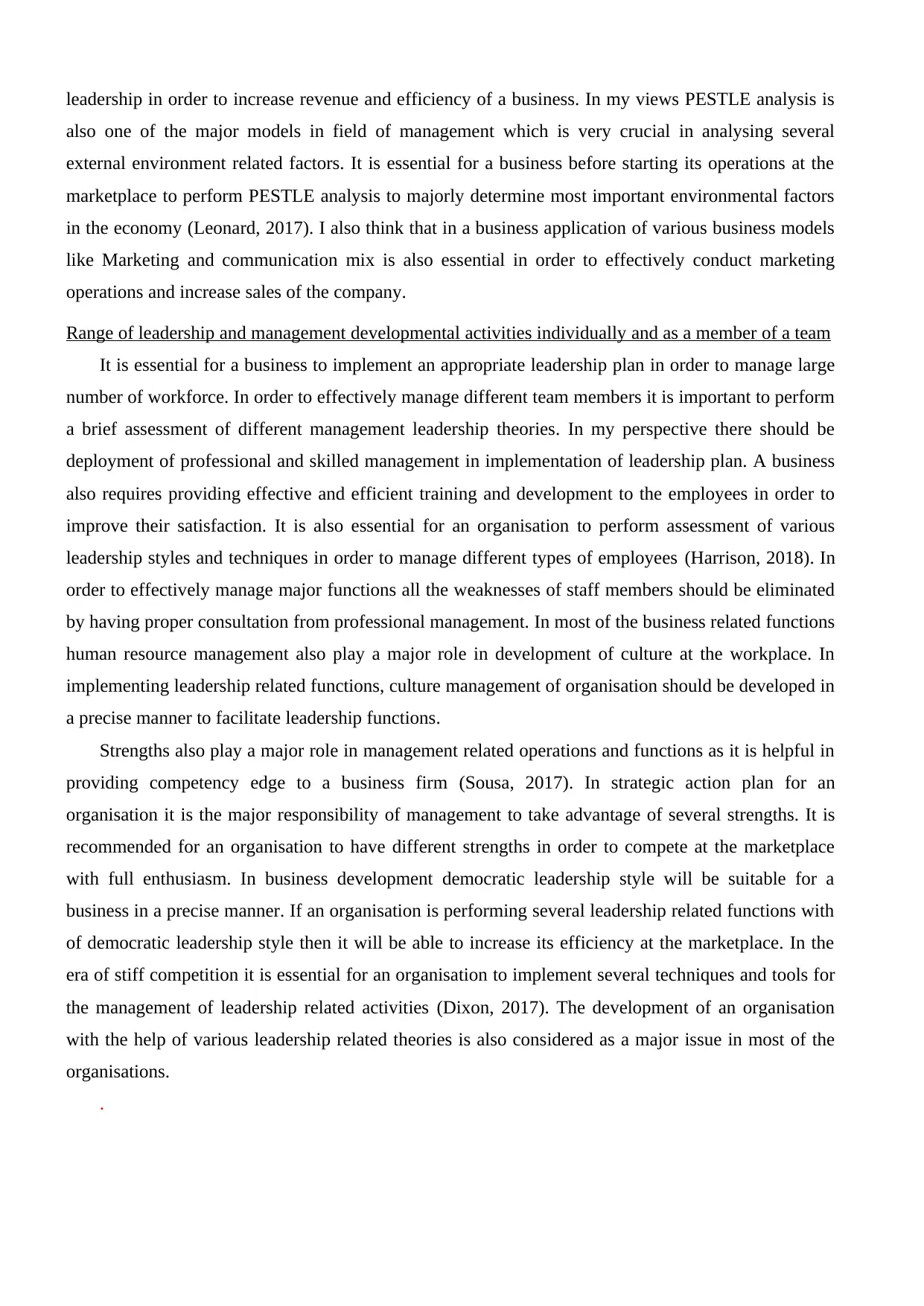
leadership in order to increase revenue and efficiency of a business. In my views PESTLE analysis is
also one of the major models in field of management which is very crucial in analysing several
external environment related factors. It is essential for a business before starting its operations at the
marketplace to perform PESTLE analysis to majorly determine most important environmental factors
in the economy (Leonard, 2017). I also think that in a business application of various business models
like Marketing and communication mix is also essential in order to effectively conduct marketing
operations and increase sales of the company.
Range of leadership and management developmental activities individually and as a member of a team
It is essential for a business to implement an appropriate leadership plan in order to manage large
number of workforce. In order to effectively manage different team members it is important to perform
a brief assessment of different management leadership theories. In my perspective there should be
deployment of professional and skilled management in implementation of leadership plan. A business
also requires providing effective and efficient training and development to the employees in order to
improve their satisfaction. It is also essential for an organisation to perform assessment of various
leadership styles and techniques in order to manage different types of employees (Harrison, 2018). In
order to effectively manage major functions all the weaknesses of staff members should be eliminated
by having proper consultation from professional management. In most of the business related functions
human resource management also play a major role in development of culture at the workplace. In
implementing leadership related functions, culture management of organisation should be developed in
a precise manner to facilitate leadership functions.
Strengths also play a major role in management related operations and functions as it is helpful in
providing competency edge to a business firm (Sousa, 2017). In strategic action plan for an
organisation it is the major responsibility of management to take advantage of several strengths. It is
recommended for an organisation to have different strengths in order to compete at the marketplace
with full enthusiasm. In business development democratic leadership style will be suitable for a
business in a precise manner. If an organisation is performing several leadership related functions with
of democratic leadership style then it will be able to increase its efficiency at the marketplace. In the
era of stiff competition it is essential for an organisation to implement several techniques and tools for
the management of leadership related activities (Dixon, 2017). The development of an organisation
with the help of various leadership related theories is also considered as a major issue in most of the
organisations.
.
also one of the major models in field of management which is very crucial in analysing several
external environment related factors. It is essential for a business before starting its operations at the
marketplace to perform PESTLE analysis to majorly determine most important environmental factors
in the economy (Leonard, 2017). I also think that in a business application of various business models
like Marketing and communication mix is also essential in order to effectively conduct marketing
operations and increase sales of the company.
Range of leadership and management developmental activities individually and as a member of a team
It is essential for a business to implement an appropriate leadership plan in order to manage large
number of workforce. In order to effectively manage different team members it is important to perform
a brief assessment of different management leadership theories. In my perspective there should be
deployment of professional and skilled management in implementation of leadership plan. A business
also requires providing effective and efficient training and development to the employees in order to
improve their satisfaction. It is also essential for an organisation to perform assessment of various
leadership styles and techniques in order to manage different types of employees (Harrison, 2018). In
order to effectively manage major functions all the weaknesses of staff members should be eliminated
by having proper consultation from professional management. In most of the business related functions
human resource management also play a major role in development of culture at the workplace. In
implementing leadership related functions, culture management of organisation should be developed in
a precise manner to facilitate leadership functions.
Strengths also play a major role in management related operations and functions as it is helpful in
providing competency edge to a business firm (Sousa, 2017). In strategic action plan for an
organisation it is the major responsibility of management to take advantage of several strengths. It is
recommended for an organisation to have different strengths in order to compete at the marketplace
with full enthusiasm. In business development democratic leadership style will be suitable for a
business in a precise manner. If an organisation is performing several leadership related functions with
of democratic leadership style then it will be able to increase its efficiency at the marketplace. In the
era of stiff competition it is essential for an organisation to implement several techniques and tools for
the management of leadership related activities (Dixon, 2017). The development of an organisation
with the help of various leadership related theories is also considered as a major issue in most of the
organisations.
.
Paraphrase This Document
Need a fresh take? Get an instant paraphrase of this document with our AI Paraphraser
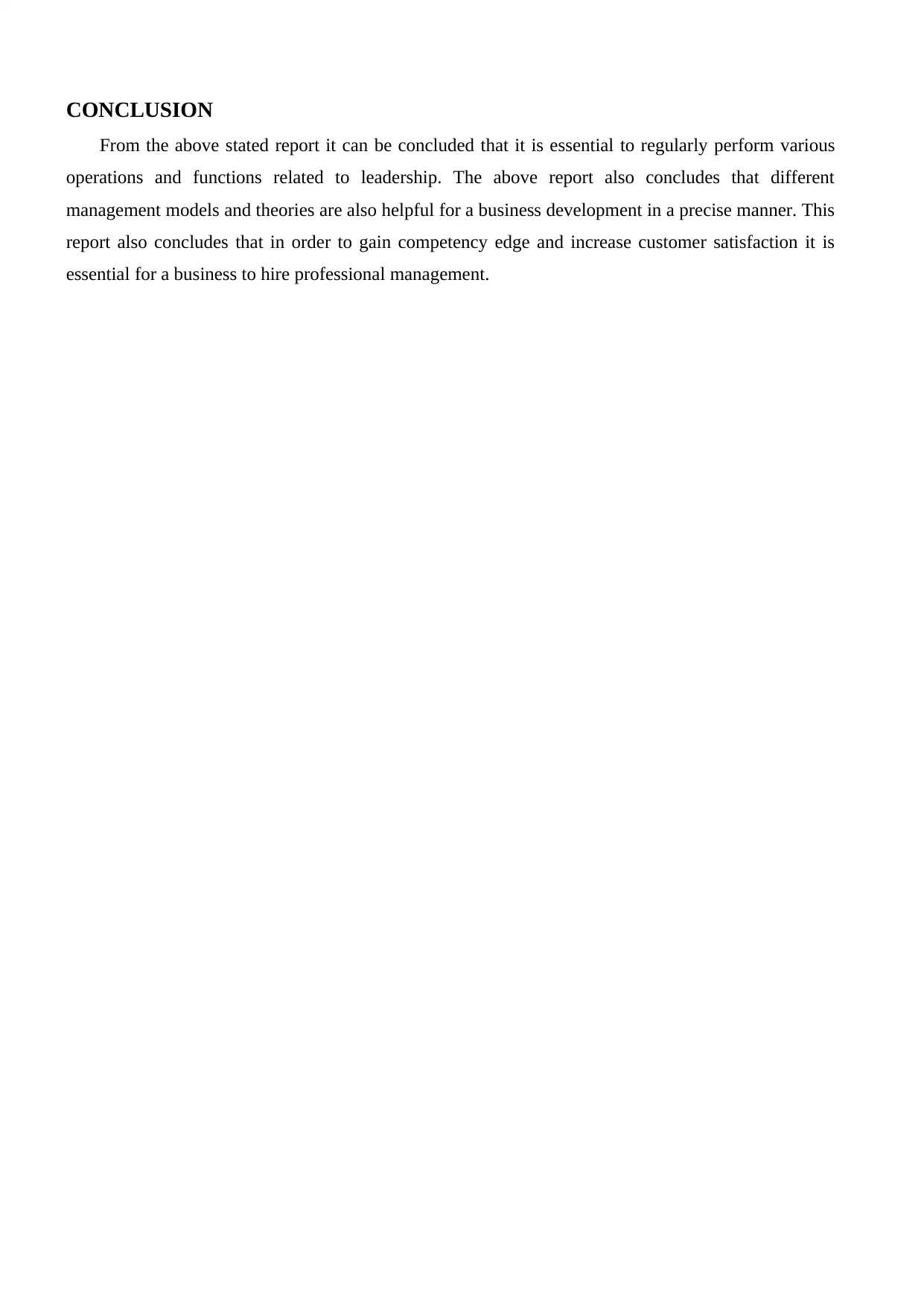
CONCLUSION
From the above stated report it can be concluded that it is essential to regularly perform various
operations and functions related to leadership. The above report also concludes that different
management models and theories are also helpful for a business development in a precise manner. This
report also concludes that in order to gain competency edge and increase customer satisfaction it is
essential for a business to hire professional management.
From the above stated report it can be concluded that it is essential to regularly perform various
operations and functions related to leadership. The above report also concludes that different
management models and theories are also helpful for a business development in a precise manner. This
report also concludes that in order to gain competency edge and increase customer satisfaction it is
essential for a business to hire professional management.
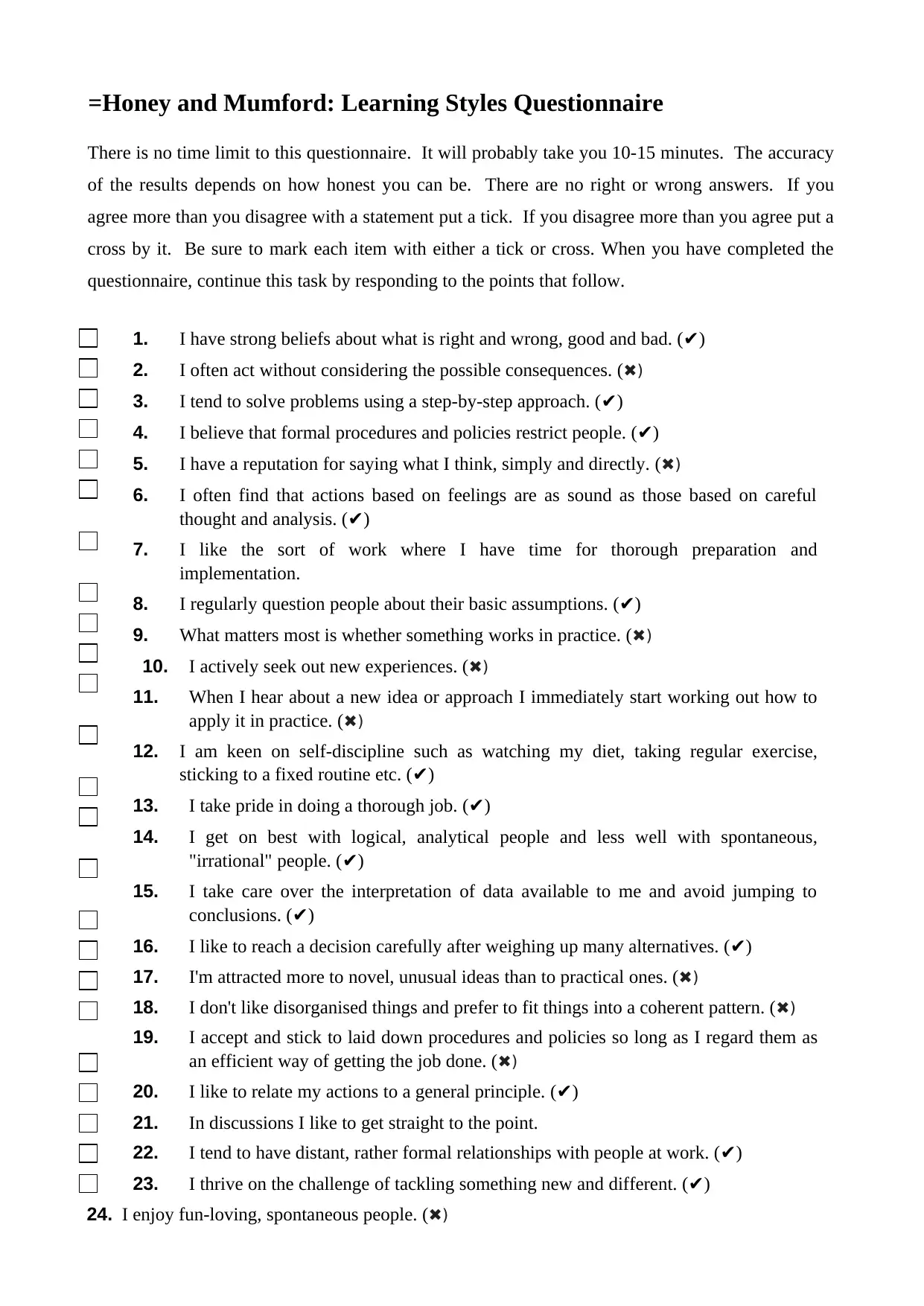
=Honey and Mumford: Learning Styles Questionnaire
There is no time limit to this questionnaire. It will probably take you 10-15 minutes. The accuracy
of the results depends on how honest you can be. There are no right or wrong answers. If you
agree more than you disagree with a statement put a tick. If you disagree more than you agree put a
cross by it. Be sure to mark each item with either a tick or cross. When you have completed the
questionnaire, continue this task by responding to the points that follow.
1. I have strong beliefs about what is right and wrong, good and bad. (✔)
2. I often act without considering the possible consequences. (✖)
3. I tend to solve problems using a step-by-step approach. (✔)
4. I believe that formal procedures and policies restrict people. (✔)
5. I have a reputation for saying what I think, simply and directly. (✖)
6. I often find that actions based on feelings are as sound as those based on careful
thought and analysis. (✔)
7. I like the sort of work where I have time for thorough preparation and
implementation.
8. I regularly question people about their basic assumptions. (✔)
9. What matters most is whether something works in practice. (✖)
10. I actively seek out new experiences. (✖)
11. When I hear about a new idea or approach I immediately start working out how to
apply it in practice. (✖)
12. I am keen on self-discipline such as watching my diet, taking regular exercise,
sticking to a fixed routine etc. (✔)
13. I take pride in doing a thorough job. (✔)
14. I get on best with logical, analytical people and less well with spontaneous,
"irrational" people. (✔)
15. I take care over the interpretation of data available to me and avoid jumping to
conclusions. (✔)
16. I like to reach a decision carefully after weighing up many alternatives. (✔)
17. I'm attracted more to novel, unusual ideas than to practical ones. (✖)
18. I don't like disorganised things and prefer to fit things into a coherent pattern. (✖)
19. I accept and stick to laid down procedures and policies so long as I regard them as
an efficient way of getting the job done. (✖)
20. I like to relate my actions to a general principle. (✔)
21. In discussions I like to get straight to the point.
22. I tend to have distant, rather formal relationships with people at work. (✔)
23. I thrive on the challenge of tackling something new and different. (✔)
24. I enjoy fun-loving, spontaneous people. (✖)
There is no time limit to this questionnaire. It will probably take you 10-15 minutes. The accuracy
of the results depends on how honest you can be. There are no right or wrong answers. If you
agree more than you disagree with a statement put a tick. If you disagree more than you agree put a
cross by it. Be sure to mark each item with either a tick or cross. When you have completed the
questionnaire, continue this task by responding to the points that follow.
1. I have strong beliefs about what is right and wrong, good and bad. (✔)
2. I often act without considering the possible consequences. (✖)
3. I tend to solve problems using a step-by-step approach. (✔)
4. I believe that formal procedures and policies restrict people. (✔)
5. I have a reputation for saying what I think, simply and directly. (✖)
6. I often find that actions based on feelings are as sound as those based on careful
thought and analysis. (✔)
7. I like the sort of work where I have time for thorough preparation and
implementation.
8. I regularly question people about their basic assumptions. (✔)
9. What matters most is whether something works in practice. (✖)
10. I actively seek out new experiences. (✖)
11. When I hear about a new idea or approach I immediately start working out how to
apply it in practice. (✖)
12. I am keen on self-discipline such as watching my diet, taking regular exercise,
sticking to a fixed routine etc. (✔)
13. I take pride in doing a thorough job. (✔)
14. I get on best with logical, analytical people and less well with spontaneous,
"irrational" people. (✔)
15. I take care over the interpretation of data available to me and avoid jumping to
conclusions. (✔)
16. I like to reach a decision carefully after weighing up many alternatives. (✔)
17. I'm attracted more to novel, unusual ideas than to practical ones. (✖)
18. I don't like disorganised things and prefer to fit things into a coherent pattern. (✖)
19. I accept and stick to laid down procedures and policies so long as I regard them as
an efficient way of getting the job done. (✖)
20. I like to relate my actions to a general principle. (✔)
21. In discussions I like to get straight to the point.
22. I tend to have distant, rather formal relationships with people at work. (✔)
23. I thrive on the challenge of tackling something new and different. (✔)
24. I enjoy fun-loving, spontaneous people. (✖)
⊘ This is a preview!⊘
Do you want full access?
Subscribe today to unlock all pages.

Trusted by 1+ million students worldwide
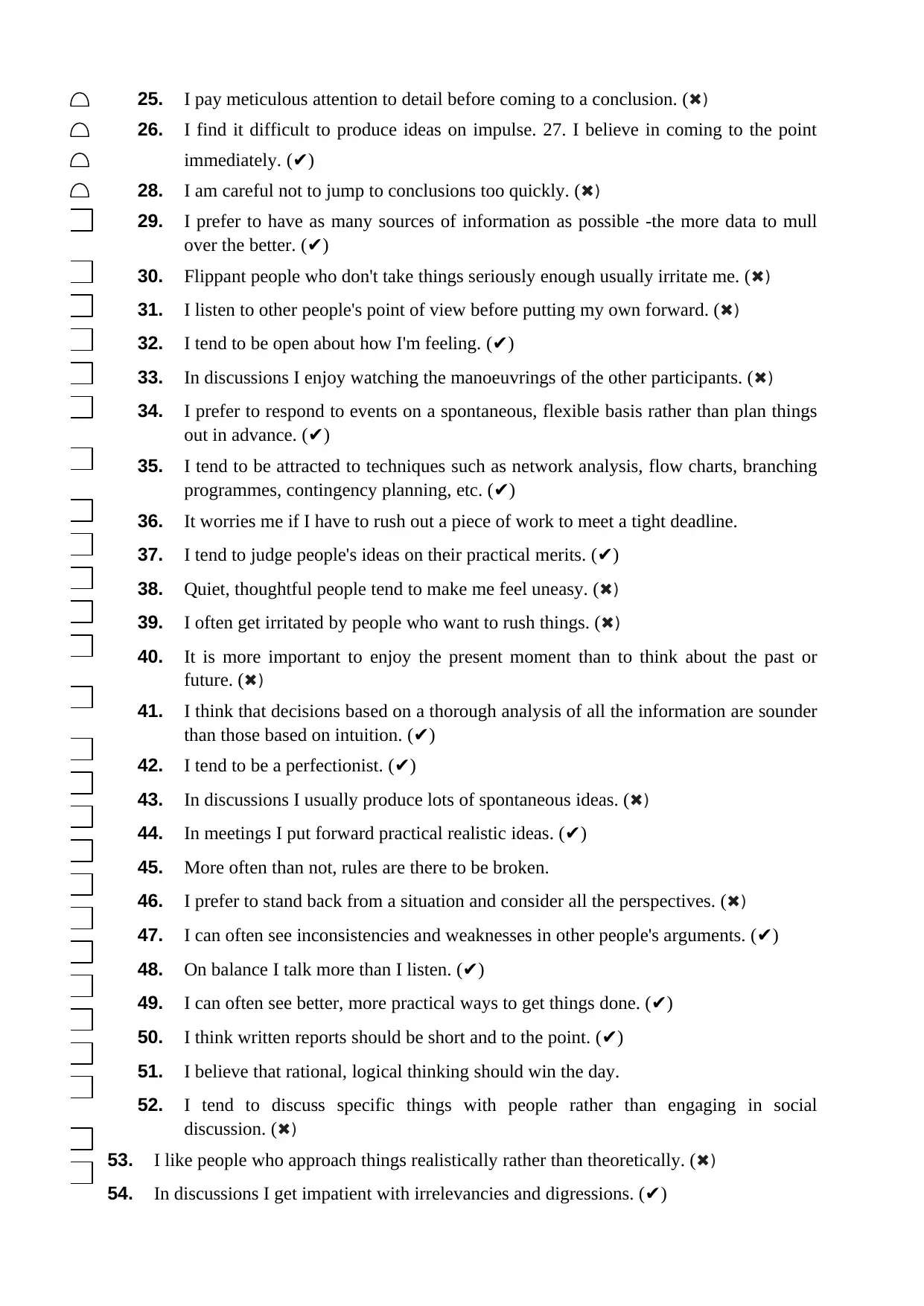
25. I pay meticulous attention to detail before coming to a conclusion. (✖)
26. I find it difficult to produce ideas on impulse. 27. I believe in coming to the point
immediately. (✔)
28. I am careful not to jump to conclusions too quickly. (✖)
29. I prefer to have as many sources of information as possible -the more data to mull
over the better. (✔)
30. Flippant people who don't take things seriously enough usually irritate me. (✖)
31. I listen to other people's point of view before putting my own forward. (✖)
32. I tend to be open about how I'm feeling. (✔)
33. In discussions I enjoy watching the manoeuvrings of the other participants. (✖)
34. I prefer to respond to events on a spontaneous, flexible basis rather than plan things
out in advance. (✔)
35. I tend to be attracted to techniques such as network analysis, flow charts, branching
programmes, contingency planning, etc. (✔)
36. It worries me if I have to rush out a piece of work to meet a tight deadline.
37. I tend to judge people's ideas on their practical merits. (✔)
38. Quiet, thoughtful people tend to make me feel uneasy. (✖)
39. I often get irritated by people who want to rush things. (✖)
40. It is more important to enjoy the present moment than to think about the past or
future. (✖)
41. I think that decisions based on a thorough analysis of all the information are sounder
than those based on intuition. (✔)
42. I tend to be a perfectionist. (✔)
43. In discussions I usually produce lots of spontaneous ideas. (✖)
44. In meetings I put forward practical realistic ideas. (✔)
45. More often than not, rules are there to be broken.
46. I prefer to stand back from a situation and consider all the perspectives. (✖)
47. I can often see inconsistencies and weaknesses in other people's arguments. (✔)
48. On balance I talk more than I listen. (✔)
49. I can often see better, more practical ways to get things done. (✔)
50. I think written reports should be short and to the point. (✔)
51. I believe that rational, logical thinking should win the day.
52. I tend to discuss specific things with people rather than engaging in social
discussion. (✖)
53. I like people who approach things realistically rather than theoretically. (✖)
54. In discussions I get impatient with irrelevancies and digressions. (✔)
26. I find it difficult to produce ideas on impulse. 27. I believe in coming to the point
immediately. (✔)
28. I am careful not to jump to conclusions too quickly. (✖)
29. I prefer to have as many sources of information as possible -the more data to mull
over the better. (✔)
30. Flippant people who don't take things seriously enough usually irritate me. (✖)
31. I listen to other people's point of view before putting my own forward. (✖)
32. I tend to be open about how I'm feeling. (✔)
33. In discussions I enjoy watching the manoeuvrings of the other participants. (✖)
34. I prefer to respond to events on a spontaneous, flexible basis rather than plan things
out in advance. (✔)
35. I tend to be attracted to techniques such as network analysis, flow charts, branching
programmes, contingency planning, etc. (✔)
36. It worries me if I have to rush out a piece of work to meet a tight deadline.
37. I tend to judge people's ideas on their practical merits. (✔)
38. Quiet, thoughtful people tend to make me feel uneasy. (✖)
39. I often get irritated by people who want to rush things. (✖)
40. It is more important to enjoy the present moment than to think about the past or
future. (✖)
41. I think that decisions based on a thorough analysis of all the information are sounder
than those based on intuition. (✔)
42. I tend to be a perfectionist. (✔)
43. In discussions I usually produce lots of spontaneous ideas. (✖)
44. In meetings I put forward practical realistic ideas. (✔)
45. More often than not, rules are there to be broken.
46. I prefer to stand back from a situation and consider all the perspectives. (✖)
47. I can often see inconsistencies and weaknesses in other people's arguments. (✔)
48. On balance I talk more than I listen. (✔)
49. I can often see better, more practical ways to get things done. (✔)
50. I think written reports should be short and to the point. (✔)
51. I believe that rational, logical thinking should win the day.
52. I tend to discuss specific things with people rather than engaging in social
discussion. (✖)
53. I like people who approach things realistically rather than theoretically. (✖)
54. In discussions I get impatient with irrelevancies and digressions. (✔)
Paraphrase This Document
Need a fresh take? Get an instant paraphrase of this document with our AI Paraphraser
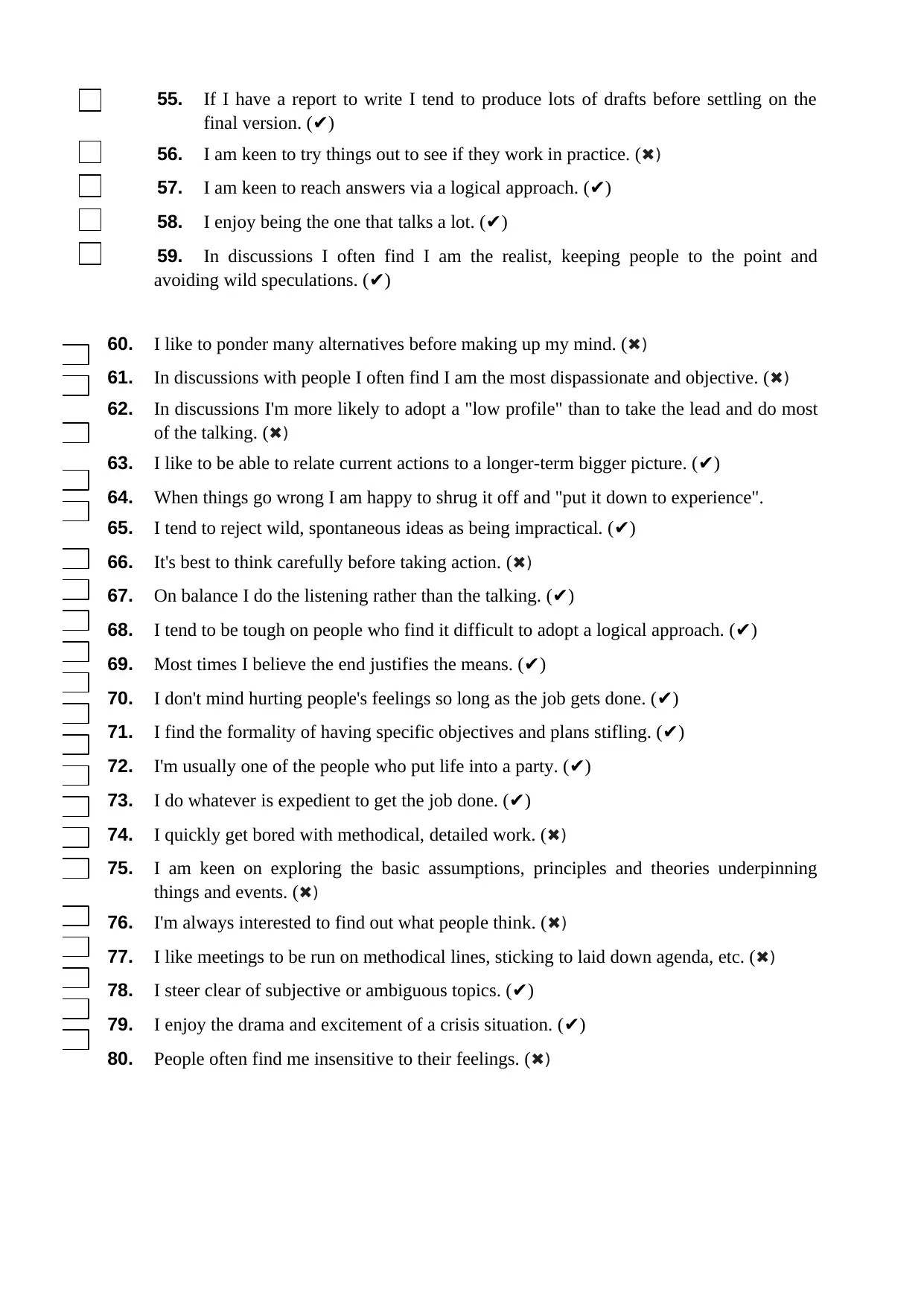
55. If I have a report to write I tend to produce lots of drafts before settling on the
final version. (✔)
56. I am keen to try things out to see if they work in practice. (✖)
57. I am keen to reach answers via a logical approach. (✔)
58. I enjoy being the one that talks a lot. (✔)
59. In discussions I often find I am the realist, keeping people to the point and
avoiding wild speculations. (✔)
60. I like to ponder many alternatives before making up my mind. (✖)
61. In discussions with people I often find I am the most dispassionate and objective. (✖)
62. In discussions I'm more likely to adopt a "low profile" than to take the lead and do most
of the talking. (✖)
63. I like to be able to relate current actions to a longer-term bigger picture. (✔)
64. When things go wrong I am happy to shrug it off and "put it down to experience".
65. I tend to reject wild, spontaneous ideas as being impractical. (✔)
66. It's best to think carefully before taking action. (✖)
67. On balance I do the listening rather than the talking. (✔)
68. I tend to be tough on people who find it difficult to adopt a logical approach. (✔)
69. Most times I believe the end justifies the means. (✔)
70. I don't mind hurting people's feelings so long as the job gets done. (✔)
71. I find the formality of having specific objectives and plans stifling. (✔)
72. I'm usually one of the people who put life into a party. (✔)
73. I do whatever is expedient to get the job done. (✔)
74. I quickly get bored with methodical, detailed work. (✖)
75. I am keen on exploring the basic assumptions, principles and theories underpinning
things and events. (✖)
76. I'm always interested to find out what people think. (✖)
77. I like meetings to be run on methodical lines, sticking to laid down agenda, etc. (✖)
78. I steer clear of subjective or ambiguous topics. (✔)
79. I enjoy the drama and excitement of a crisis situation. (✔)
80. People often find me insensitive to their feelings. (✖)
final version. (✔)
56. I am keen to try things out to see if they work in practice. (✖)
57. I am keen to reach answers via a logical approach. (✔)
58. I enjoy being the one that talks a lot. (✔)
59. In discussions I often find I am the realist, keeping people to the point and
avoiding wild speculations. (✔)
60. I like to ponder many alternatives before making up my mind. (✖)
61. In discussions with people I often find I am the most dispassionate and objective. (✖)
62. In discussions I'm more likely to adopt a "low profile" than to take the lead and do most
of the talking. (✖)
63. I like to be able to relate current actions to a longer-term bigger picture. (✔)
64. When things go wrong I am happy to shrug it off and "put it down to experience".
65. I tend to reject wild, spontaneous ideas as being impractical. (✔)
66. It's best to think carefully before taking action. (✖)
67. On balance I do the listening rather than the talking. (✔)
68. I tend to be tough on people who find it difficult to adopt a logical approach. (✔)
69. Most times I believe the end justifies the means. (✔)
70. I don't mind hurting people's feelings so long as the job gets done. (✔)
71. I find the formality of having specific objectives and plans stifling. (✔)
72. I'm usually one of the people who put life into a party. (✔)
73. I do whatever is expedient to get the job done. (✔)
74. I quickly get bored with methodical, detailed work. (✖)
75. I am keen on exploring the basic assumptions, principles and theories underpinning
things and events. (✖)
76. I'm always interested to find out what people think. (✖)
77. I like meetings to be run on methodical lines, sticking to laid down agenda, etc. (✖)
78. I steer clear of subjective or ambiguous topics. (✔)
79. I enjoy the drama and excitement of a crisis situation. (✔)
80. People often find me insensitive to their feelings. (✖)
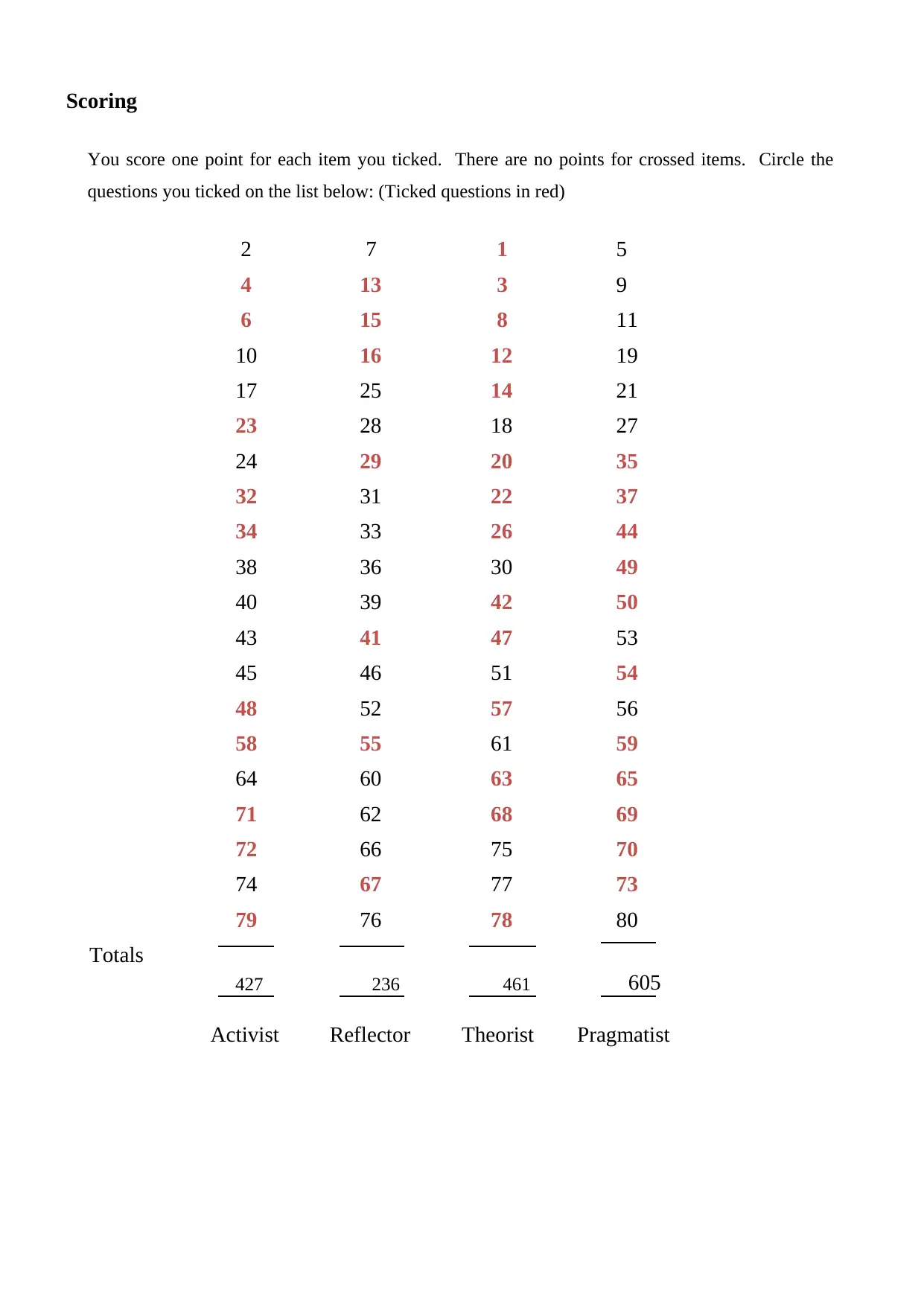
Scoring
You score one point for each item you ticked. There are no points for crossed items. Circle the
questions you ticked on the list below: (Ticked questions in red)
2 7 1 5
4 13 3 9
6 15 8 11
10 16 12 19
17 25 14 21
23 28 18 27
24 29 20 35
32 31 22 37
34 33 26 44
38 36 30 49
40 39 42 50
43 41 47 53
45 46 51 54
48 52 57 56
58 55 61 59
64 60 63 65
71 62 68 69
72 66 75 70
74 67 77 73
79 76 78 80
Totals
427 236 461 605
Activist Reflector Theorist Pragmatist
You score one point for each item you ticked. There are no points for crossed items. Circle the
questions you ticked on the list below: (Ticked questions in red)
2 7 1 5
4 13 3 9
6 15 8 11
10 16 12 19
17 25 14 21
23 28 18 27
24 29 20 35
32 31 22 37
34 33 26 44
38 36 30 49
40 39 42 50
43 41 47 53
45 46 51 54
48 52 57 56
58 55 61 59
64 60 63 65
71 62 68 69
72 66 75 70
74 67 77 73
79 76 78 80
Totals
427 236 461 605
Activist Reflector Theorist Pragmatist
⊘ This is a preview!⊘
Do you want full access?
Subscribe today to unlock all pages.

Trusted by 1+ million students worldwide
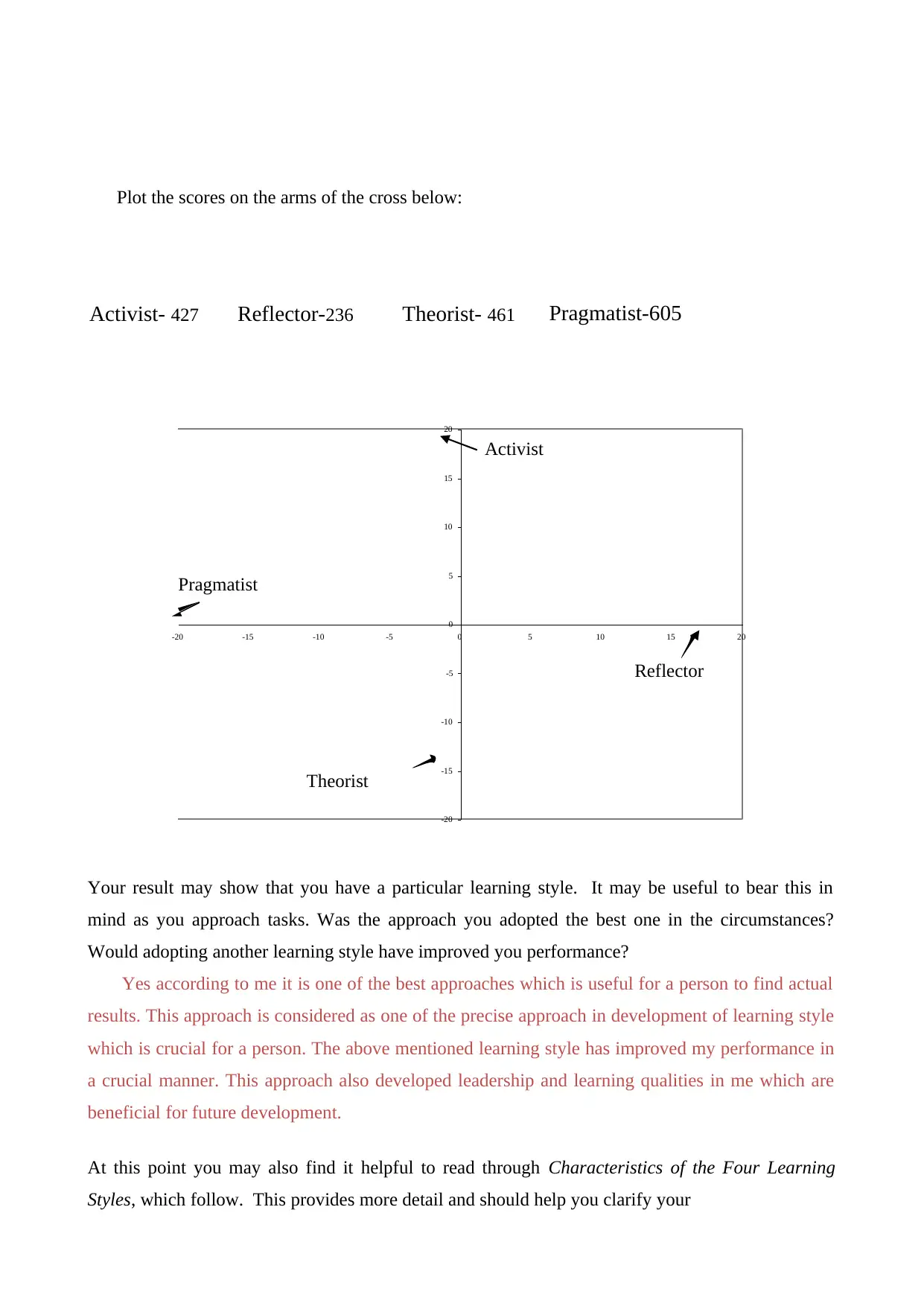
Plot the scores on the arms of the cross below:
Activist- 427 Reflector-236 Theorist- 461 Pragmatist-605
Your result may show that you have a particular learning style. It may be useful to bear this in
mind as you approach tasks. Was the approach you adopted the best one in the circumstances?
Would adopting another learning style have improved you performance?
Yes according to me it is one of the best approaches which is useful for a person to find actual
results. This approach is considered as one of the precise approach in development of learning style
which is crucial for a person. The above mentioned learning style has improved my performance in
a crucial manner. This approach also developed leadership and learning qualities in me which are
beneficial for future development.
At this point you may also find it helpful to read through Characteristics of the Four Learning
Styles, which follow. This provides more detail and should help you clarify your
-20
-15
-10
-5
0
5
10
15
20
-20 -15 -10 -5 0 5 10 15 20
Activist
Pragmatist
Reflector
Theorist
Activist- 427 Reflector-236 Theorist- 461 Pragmatist-605
Your result may show that you have a particular learning style. It may be useful to bear this in
mind as you approach tasks. Was the approach you adopted the best one in the circumstances?
Would adopting another learning style have improved you performance?
Yes according to me it is one of the best approaches which is useful for a person to find actual
results. This approach is considered as one of the precise approach in development of learning style
which is crucial for a person. The above mentioned learning style has improved my performance in
a crucial manner. This approach also developed leadership and learning qualities in me which are
beneficial for future development.
At this point you may also find it helpful to read through Characteristics of the Four Learning
Styles, which follow. This provides more detail and should help you clarify your
-20
-15
-10
-5
0
5
10
15
20
-20 -15 -10 -5 0 5 10 15 20
Activist
Pragmatist
Reflector
Theorist
Paraphrase This Document
Need a fresh take? Get an instant paraphrase of this document with our AI Paraphraser

Sense of your own preferred style(s)
The four learning styles are compulsory in development of major learning in individuals. These
learning styles are essential for a person in grabbing precise knowledge from the environment. The
four styles of learning are practised in major universities in order to develop learning power in
students.
The four learning styles are compulsory in development of major learning in individuals. These
learning styles are essential for a person in grabbing precise knowledge from the environment. The
four styles of learning are practised in major universities in order to develop learning power in
students.
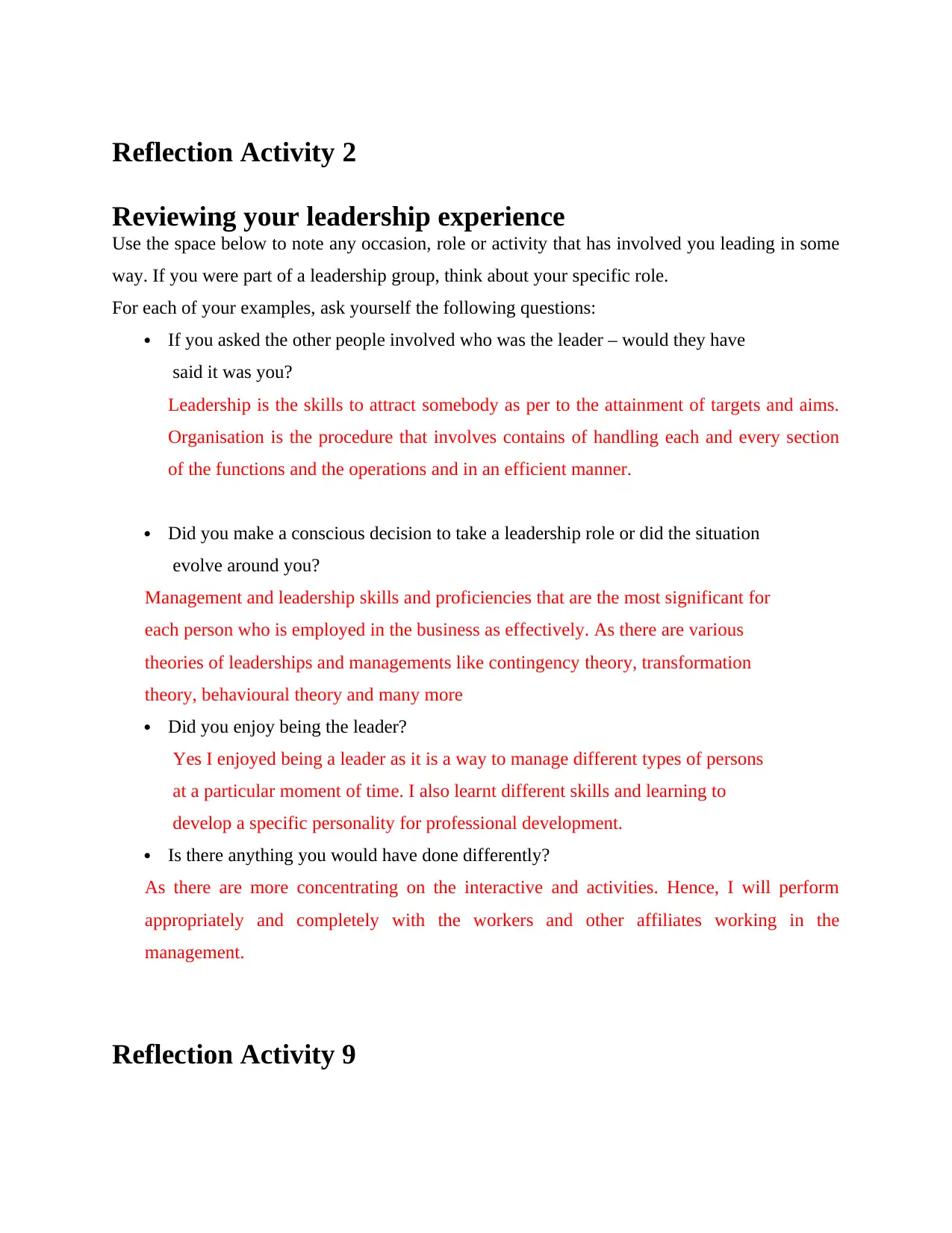
Reflection Activity 2
Reviewing your leadership experience
Use the space below to note any occasion, role or activity that has involved you leading in some
way. If you were part of a leadership group, think about your specific role.
For each of your examples, ask yourself the following questions:
If you asked the other people involved who was the leader – would they have
said it was you?
Leadership is the skills to attract somebody as per to the attainment of targets and aims.
Organisation is the procedure that involves contains of handling each and every section
of the functions and the operations and in an efficient manner.
Did you make a conscious decision to take a leadership role or did the situation
evolve around you?
Management and leadership skills and proficiencies that are the most significant for
each person who is employed in the business as effectively. As there are various
theories of leaderships and managements like contingency theory, transformation
theory, behavioural theory and many more
Did you enjoy being the leader?
Yes I enjoyed being a leader as it is a way to manage different types of persons
at a particular moment of time. I also learnt different skills and learning to
develop a specific personality for professional development.
Is there anything you would have done differently?
As there are more concentrating on the interactive and activities. Hence, I will perform
appropriately and completely with the workers and other affiliates working in the
management.
Reflection Activity 9
Reviewing your leadership experience
Use the space below to note any occasion, role or activity that has involved you leading in some
way. If you were part of a leadership group, think about your specific role.
For each of your examples, ask yourself the following questions:
If you asked the other people involved who was the leader – would they have
said it was you?
Leadership is the skills to attract somebody as per to the attainment of targets and aims.
Organisation is the procedure that involves contains of handling each and every section
of the functions and the operations and in an efficient manner.
Did you make a conscious decision to take a leadership role or did the situation
evolve around you?
Management and leadership skills and proficiencies that are the most significant for
each person who is employed in the business as effectively. As there are various
theories of leaderships and managements like contingency theory, transformation
theory, behavioural theory and many more
Did you enjoy being the leader?
Yes I enjoyed being a leader as it is a way to manage different types of persons
at a particular moment of time. I also learnt different skills and learning to
develop a specific personality for professional development.
Is there anything you would have done differently?
As there are more concentrating on the interactive and activities. Hence, I will perform
appropriately and completely with the workers and other affiliates working in the
management.
Reflection Activity 9
⊘ This is a preview!⊘
Do you want full access?
Subscribe today to unlock all pages.

Trusted by 1+ million students worldwide
1 out of 17
Related Documents
Your All-in-One AI-Powered Toolkit for Academic Success.
+13062052269
info@desklib.com
Available 24*7 on WhatsApp / Email
![[object Object]](/_next/static/media/star-bottom.7253800d.svg)
Unlock your academic potential
Copyright © 2020–2026 A2Z Services. All Rights Reserved. Developed and managed by ZUCOL.



